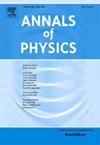Discussion on the weak equivalence principle for a Schwarzschild gravitational field based on the light-clock model
IF 3
3区 物理与天体物理
Q2 PHYSICS, MULTIDISCIPLINARY
引用次数: 0
Abstract
Inspired by special relativity, we put forward the idea the mass of particles is an emergent phenomenon. It assumed that matter is composed by two groups of massless particles (photons) and mass results from the entanglement among them. We refer to this conjecture as the light-clock model of massive matter. The relation between the intrinsic acceleration of light and the ideal dielectric refractive index is derived from the Eikonal equation. For light in the light-clock model, the relative motion refractive index and the local Schwarzschild gravitational field refractive index are defined according to the Minkowski metric and the Schwarzschild metric, respectively, and are used to prove that the weak equivalence principle in Schwarzschild gravitational field is a corollary of the least action principle.
在狭义相对论的启发下,我们提出了粒子质量是一种突现现象的观点。它假设物质是由两组无质量的粒子(光子)组成的,质量是由它们之间的纠缠产生的。我们把这个猜想称为大质量物质的光钟模型。利用Eikonal方程导出了光的固有加速度与理想介质折射率之间的关系。对于光钟模型中的光,分别根据Minkowski度规和Schwarzschild度规定义了相对运动折射率nr和局部Schwarzschild引力场折射率nl,并证明了Schwarzschild引力场中的弱等效原理是最小作用原理的必然结果。
本文章由计算机程序翻译,如有差异,请以英文原文为准。
求助全文
约1分钟内获得全文
求助全文
来源期刊

Annals of Physics
物理-物理:综合
CiteScore
5.30
自引率
3.30%
发文量
211
审稿时长
47 days
期刊介绍:
Annals of Physics presents original work in all areas of basic theoretic physics research. Ideas are developed and fully explored, and thorough treatment is given to first principles and ultimate applications. Annals of Physics emphasizes clarity and intelligibility in the articles it publishes, thus making them as accessible as possible. Readers familiar with recent developments in the field are provided with sufficient detail and background to follow the arguments and understand their significance.
The Editors of the journal cover all fields of theoretical physics. Articles published in the journal are typically longer than 20 pages.
 求助内容:
求助内容: 应助结果提醒方式:
应助结果提醒方式:


